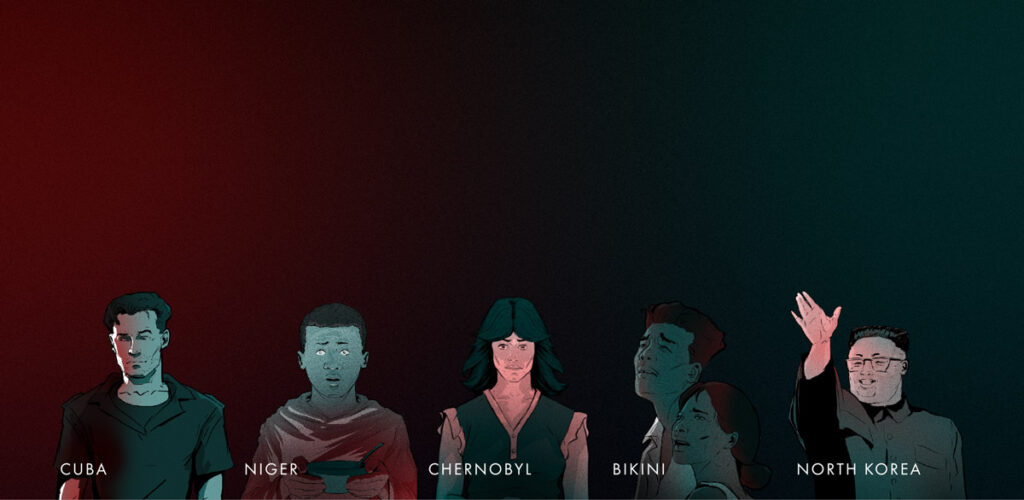Basel, Switzerland – July 23, 2021
NEWS RELEASE
For immediate release
Contacts:
In New York, USA: Stephen Kent, skent@kentcom.com +1 914 589 5988
In Prague, Czech Republic: Vanda Proskova, vanda@pnnd.org, +420 728 407 661
In Basel, Switzerland: Dr. Andreas Nidecker, anidecker@bluewin.ch, +41 76 557 37 12
Today, coinciding with the opening ceremony of the Tokyo Olympic Games, a coalition of NGOs and youth leaders launched “Nuclear Games,” an innovative film and online platform addressing our nuclear history and the risks and impacts of nuclear weapons and energy.
“Nuclear Games” was developed by interactive videobooks pioneer Docmine, a Swiss-based creative studio, with support from Basel Peace Office, Youth Fusion , Physicians for Social Responsibility / International Physicians for the Prevention of Nuclear War Switzerland and the World Future Council. It’s offered in English and German, and aimed at non-usual suspects: people who don’t typically watch political documentaries or engage in anti-nuclear advocacy work. It will have particular resonance with younger viewers, many of whom are unfamiliar with the history it conveys of nuclear disasters, near misses, and ongoing threats and impacts.
It shines a light on nuclear issues which are deliberately downplayed by governments, including by Japan as it presents the Tokyo Olympics. Japan experienced nuclear bombings in 1945 and one of the world’s most devastating nuclear power accidents in 2011, and remains deeply affected by them.
“Nuclear Games” tells the stories of the Cuban Missile Crisis, the Chernobyl disaster, the victims of uranium mining and nuclear testing and the North Korean nuclear program, using a unique combination of manga, historical footage, and interactive online content designed to engage younger audiences.
The package consists of five short manga stories about real people in the center of these historical events, an hour-long animated feature film, and a “web documentary” platform which serves up the interactive content. A trailer for the feature film is posted here. Screener links for the film, the manga stories and the web documentary will be provided to journalists on request.
Today’s launch of “Nuclear Games” in connection with the opening of the Olympic Games contrasts the Olympic ideals of peace and humanity with the continuing violence and harms of nuclear energy, nuclear energy, and the resurgent arms race.
It also counters the Japanese government’s framing of the Olympics as the “recovery games.” Protests by Japanese citizens against holding the games despite the surge in COVID in Tokyo are in the headlines now. But in 2019, before the pandemic hit, Japan’s then prime minister Shinzo Abe declared that the Tokyo Olympics would be the “recovery games,” designed to “showcase” Fukushima’s recovery from the catastrophic 2011 meltdown of the Fukushima Daiichi nuclear plant.
In the runup to today’s Olympic opening ceremony, the Olympic torch relay was deliberately routed through Fukushima Prefecture, including the towns where the plant is located, and others nearby that were long abandoned in the wake of the disaster. Olympic baseball and softball competitions are also being held in a stadium in Fukushima Prefecture.
“This is government spin, deliberately minimizing and normalizing the disaster, and ignoring Fukushima’s ongoing impacts and threats to public safety,” said Dr. Andreas Nidecker, MD, Basel Peace Office president and the originator of the “Nuclear Games” concept.
“Billions will watch the Olympics and get the carefully crafted message that everything in Fukushima is fine, and that nuclear meltdowns are quickly lived down. But that’s dangerous denialism. We need a global education effort to promote basic literacy about nuclear dangers in order to make future nuclear disasters less likely.”
In fact, nuclear dangers and tensions are rising today. According to the Pentagon, the risk of nuclear war is growing. The Bulletin of the Atomic Scientists’ Doomsday Clock remained this year at 100 seconds to midnight – closer to nuclear war even than during the Cuban Missile Crisis.
“But many young people aren’t even aware of the Cuban missile crisis, let alone the fact that nuclear dangers are worse now than in 1962,” said Vanda Proskova, co-convener of Youth Fusion and a graduate student in international law who is active on nuclear issues. She serves as the Vice Chair of PragueVision Institute for Sustainable Security and Co-Director of the Gender, Peace and Security program at Parliamentarians for Nuclear Nonproliferation and Disarmament.
“That’s why nuclear education efforts like this are so important. When they learn the facts and the history, many young people want to do something about it. ‘Nuclear Games’ is a wonderful tool for engaging more of them in the nuclear disarmament movement.”
As “Nuclear Games” points out, less than two years after the Cuban Missile Crisis, Japan also used the 1964 Tokyo Olympics to convey an upbeat message to the world about Japan’s recovery from the atomic bombings of Hiroshima and Nagasaki. It sought to showcase Japan as a modern nation with its own nuclear program, enjoying normalcy and benefitting from nuclear technology despite the bombings.
But that’s not how survivors and residents of Hiroshima see it. Last week, when International Olympic Committee president Thomas Bach visited Hiroshima on the anniversary of the Trinity nuclear tests, he was met with large protests and accused of trying to use Hiroshima’s history to justify holding the Olympics despite the pandemic, against the will of Japan’s people. Local citizens groups called Bach’s gesture “blasphemy to atomic bombing survivors,” and said it harmed nuclear abolition efforts.
Through innovative storytelling and education techniques, “Nuclear Games” aims to highlight the human side of nuclear issues, engage and inspire more people to get involved, counter the pro-nuclear spin of the Tokyo Olympics, and teach essential nuclear literacy to a new generation.
NOTE TO EDITORS AND PRODUCERS: Screener links journalists can use to explore “Nuclear Games” are available on request. Sources quoted in this release and other expert sources are also available for interviews. To request links, arrange interviews, or for further information, please contact Stephen Kent, skent@kentcom.com +1 914 589 5988.
